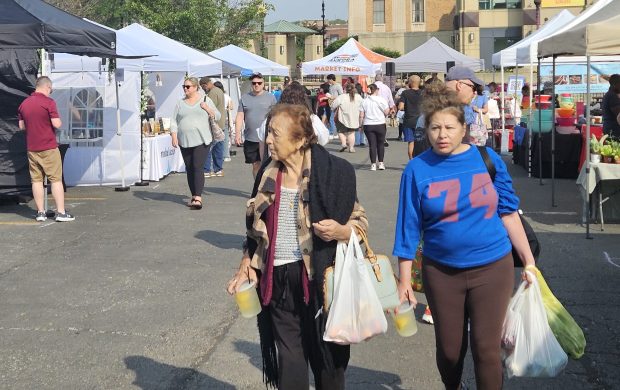Talking with teens these days is always eye-opening, and my time spent with dozens of students at East Aurora High School last week was certainly no exception.
The reason for this visit: An invitation to speak at the school’s “Find Your Future Wednesday,” a partnership that twice-monthly connects community, industry and business leaders with students, according to founder and Kane County Board member Anita Lewis.
It was an invitation I gladly accepted because it gave me the opportunity to interact with potential future leaders in our communities, while also climbing on my favorite soapbox: News literacy.
For three hours I spoke with students from James Ross’ journalism class and Julie Taylor’s ESL classes about the importance of being able to evaluate the reliability and credibility of news sources, including those often mistaken for journalism.
On this day, language was definitely a barrier, and I don’t mean the communication gap between a Baby Boomer and a group of Gen-Zers.
There are now more than 60 languages spoken among students in East Aurora School District 131, according to East Aurora School Board President Annette Johnson, many who come not just from Mexico but Venezuela and Guatemala (which have different dialects) as well as through European and Asian countries working with World Relief.
Which made communicating more challenging, especially since Taylor herself only speaks limited Spanish.
Yet one message – predictable at this point but still disheartening – came through loud and clear via a few much-appreciated student translators: TikTok is their main source of information, and these ESL students seemed genuinely surprised when I suggested they start thinking about the difference between a credible news source and one that can so easily lead them down a one-way misinformation highway.
Because the journalism students from Ross’ class did not have a language barrier, it was far easier to engage in a two-way exchange of thoughts. But this time I was the one who had my eyes opened a little wider.
More kids than ever, I was told, are beginning to recognize the downside of too much technology.
According to senior Leila Huerta, there is a noticeable trend on social media platforms that show a “growing appreciation for physical media.”
The reason: As digital content becomes increasingly ubiquitous, more young people are longing for “tangible forms of media,” which is driven not only by nostalgia but a “deep-seated fear of valuable digital information becoming inaccessible or lost,” she said.
While this concern about a “digital dark age” is not new, Leila insists it has gained momentum in recent years, particularly through platforms like TikTok, which has amplified awareness and appreciation for physical items like music records and CDs, handwritten journals, memory boxes, magazines, books and yes, even newspapers.
“Unlike digital files, which can be easily deleted, altered or lost, physical objects possess a lasting quality that imbues them with history and performance,” said this obviously bright teen.
As if to make that point more clear, while I was talking to these kids, East’s Head Basketball Coach Ricky Robinson stopped by to chat, holding in his hands a thick folder he’d been given that contained dozens of newspaper articles and photos covering the legendary career of Ernie Kivisto, who successfully coached the Tomcats from 1967 to 1982.
Without a vibrant local newspaper so thoroughly covering his incredible impact in this community, much of his story, noted Robinson, would have been lost to the ages.
And according to these students, their peers are starting to understand that, which is not only encouraging news for my industry, but for democracy in general.
“Our generation is really behind their phones, and expect their parents and other adults to hold their hands through life,” noted junior Alyssa Olivas. “But there are other students who realize life is not like that and there needs to be change. We are the ones who need to make that change. But it’s never going to happen unless we push ourselves and each other.
“We see it,” she insisted. “And we are ready to step forward to make it happen.”
dcrosby@tribpub.com




